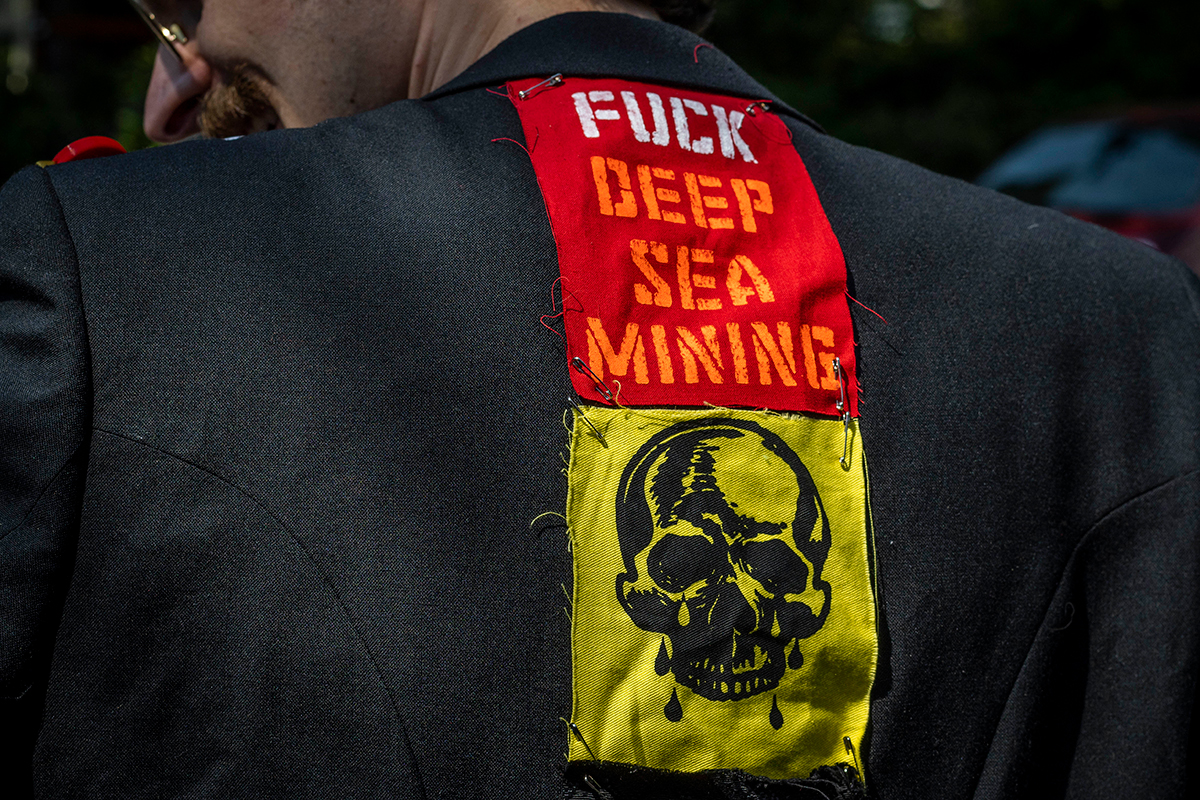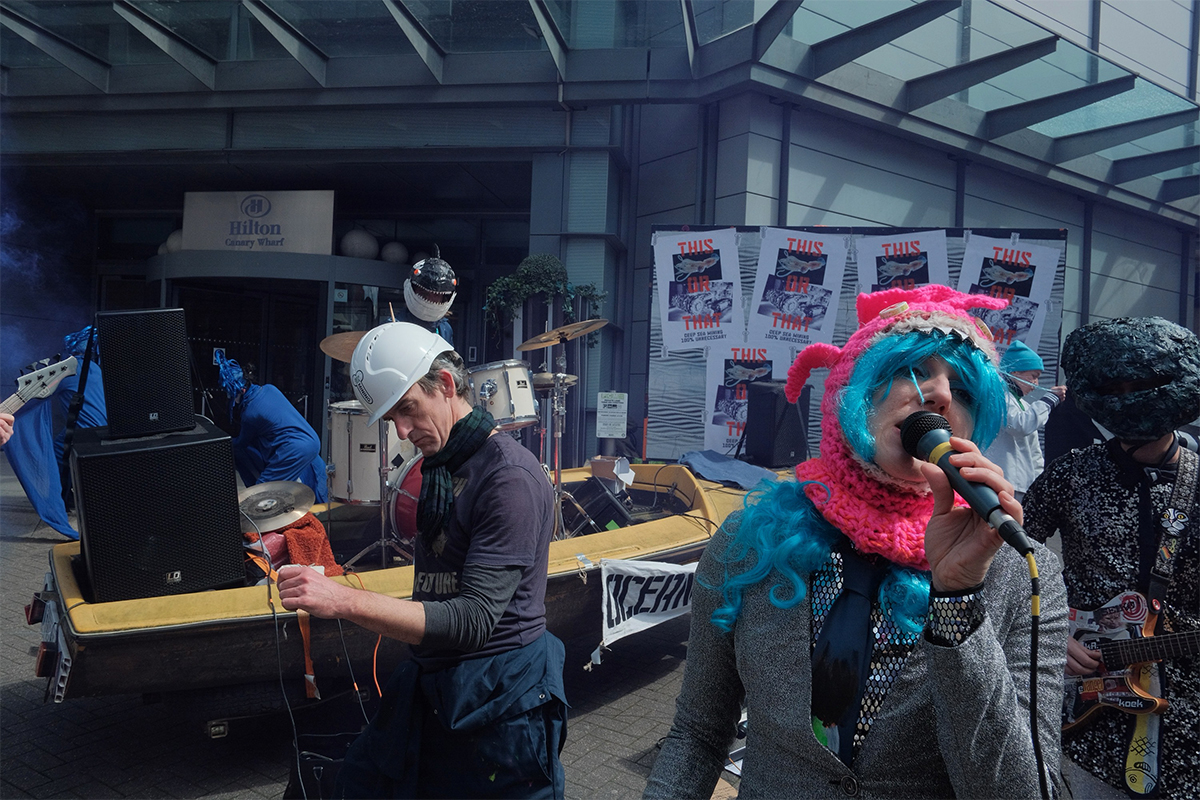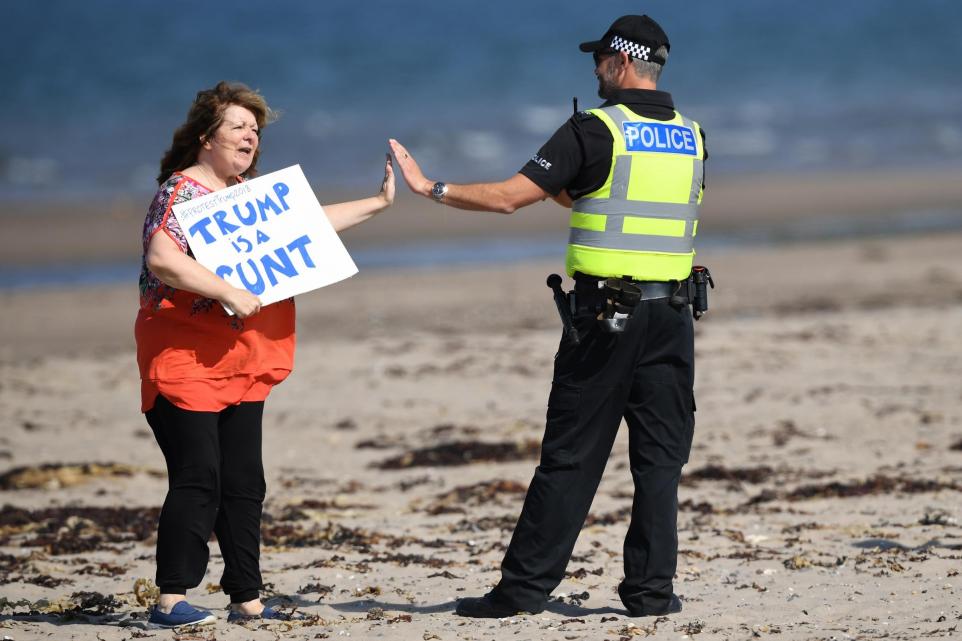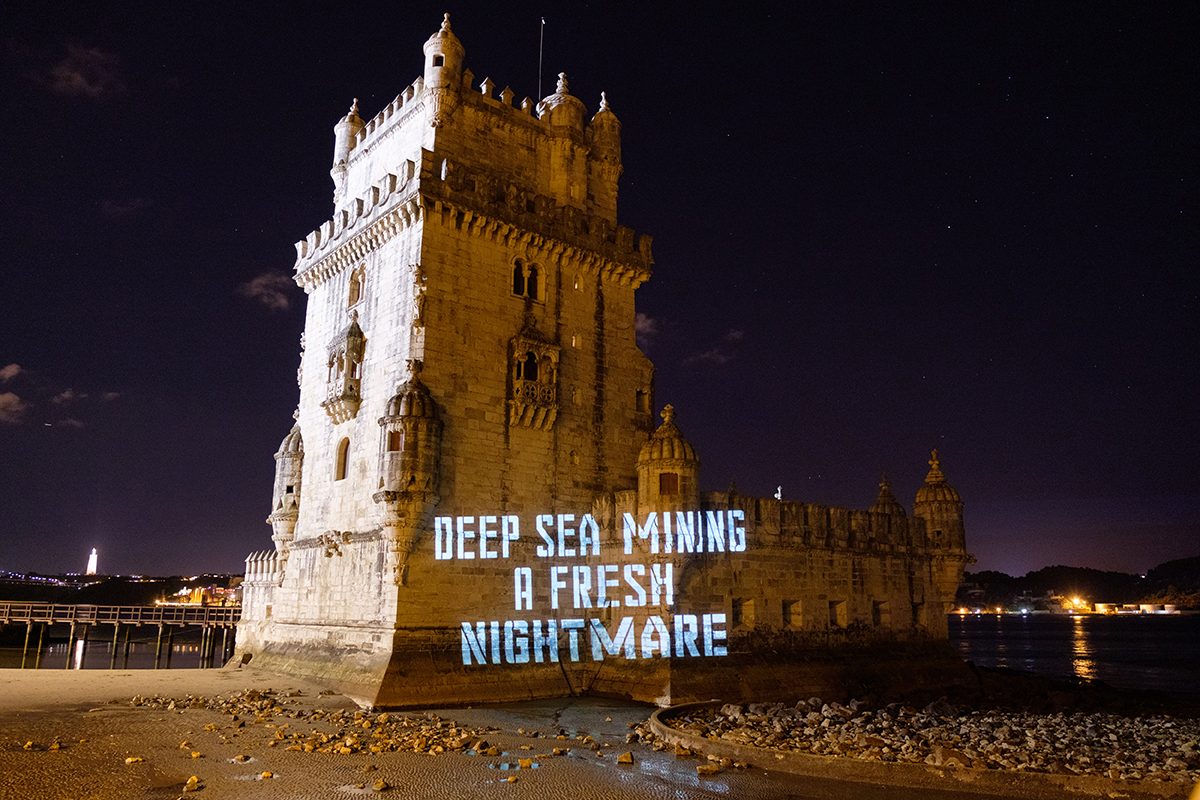Trump tears up Law of the Sea and Risks War
03.06.2025

By Guy Standing, Professorial Research Associate, SOAS University of London, and author of The Blue Commons: Rescuing the Economy of the Sea.
On April 24, President Donald Trump issued an executive order giving the green light for American companies to mine for minerals in the deep seas of the world. The order, a violation of international law that regards the deep seabed as a global commons belonging to all, could be the most globally consequential of all the 143 orders hastily issued in Trump’s first 100 days.
Scientists and civil society groups have highlighted the environmental dangers of deep sea mining, which have led many countries to call for a moratorium. But the order also resurrects the risk of armed conflict between the world’s technological powers, the avoidance of which was the impetus for the 1982 United Nations Convention on the Law of the Sea (UNCLOS).
⬆️ Ocean Rebellion targets the Hidden Gem, the flag (and only ship) of the MetalsCo in February 2022, Video by Sven Peetoom.
—
In an electrifying speech in the United Nations General Assembly in 1967, the Maltese diplomat Arvin Pardo pleaded for the deep sea bed to be treated as ‘the common heritage of mankind’, warning that, otherwise, competition for the resources of the ocean floor would inevitably spark military confrontation. His speech that day galvanized the protracted negotiations that concluded in adoption of UNCLOS fifteen years later.
Pardo himself was bitterly disappointed by the final outcome, which included giving littoral states jurisdiction over large areas of adjoining ocean and seabed as Exclusive Economic Zones (EEZs). However, UNCLOS also enshrined in international law that the deep seabed was ‘the common heritage of mankind’ and as such a global commons, just as first declared in the Roman Justinian Codex of AD534, the base of common law to this day. The UN Secretary General, Javier Pérez de Cuéllar, described UNCLOS as ‘the most significant legal instrument of the century’.
UNCLOS brought to an end centuries of maritime power rivalry for domination of the high seas and decades of postwar tension and skirmishes over territorial waters that followed the Truman Proclamation of 1945. This unilateral pronouncement declared all the large continental shelf off the US coast to be American territory, an act of imperial power, literally an ’ocean grab’. Previously, all the seas and seabed, excepting near-shore coastal waters, were regarded as commons. Soon, other countries began to declare 200 nautical miles (370 kms) off their coasts as their territory. It was a recipe for chaos and conflict.

⬆️ The renamed heavy metals band ‘The Seabed Slayers’ will be appearing at the UN Ocean Conference, 7 – 10 June, Nice, contact us for information.
—
UNCLOS dealt with this by universalising the 200 nautical mile rule. Altogether, 138 million square kilometres of ocean were enclosed as national EEZs. There were some obvious inequities. Thus, France and the USA, with ocean island colonies and territories, gained most, each gaining over 11 million square kilometres of sea and seabed, while China received a mere 900,000.
However, the essence of the UNCLOS negotiations was that all countries would obtain some advantages at the cost of some concessions. In the final bargain, every coastal state obtained a 200-mile EEZ, the superpowers obtained freedom of navigation in all waters beyond the coastal 12-mile limit, and developing countries and the 43 landlocked countries thought they had obtained an agreement promising that they would benefit from any future mining in the deep sea, in return for which they allowed the United States and other powers access to their fishing grounds.
China led the developing countries in pressing for benefit sharing from exploitation of the global commons. Given the unfair and arbitrary EEZ rule, China would have good reason to feel cheated if Washington now reneges on its side of what was in US terms a very good deal. Although the USA, alone among the major powers, refused to sign or ratify UNCLOS, it helped to shape its provisions and remains bound by them under customary international law. Some 168 countries and the European Union are States Parties.
Outside the EEZs, UNCLOS established what is called the ‘Area’, the 54% of the seabed, ocean floor and subsoil beyond national jurisdiction. The International Seabed Authority (ISA) was set up under UNCLOS in 1994 to draw up a Mining Code for deep sea mining in the Area that included environmental safeguards and a formula for equitable benefit sharing. No deep sea mining was to start until a Code had been agreed.
The USA and other rich countries insisted that the Code be agreed by consensus, that is, by all countries, not just a majority, because they did not want to give power to developing countries. The USA got its way there too and has been active in the subsequent negotiations, despite not being an ISA member.
The fate of the Ocean depends on us all.
Our interventions depend on your support.
Trump’s executive order envisages granting licences to American-backed mining companies to exploit the Area as well as US waters, for the sole benefit of the USA and without any of the environmental protections and benefit-sharing provisions ISA is now negotiating. The order does not make a single mention of UNCLOS or the international regulatory system that has given the USA such a strong position.
For instance, despite not ratifying UNCLOS, Washington is applying Article 76 that allows countries to extend their EEZ beyond 200 nautical miles to areas deemed to belong to its ‘extended continental shelf’. As a result, whereas most coastal countries have 200 nautical square miles as EEZ, the USA has 680 miles off its west coast and 350 miles off its east coast. It really is the world’s biggest ‘rip off’.
Some critics have said that the costs and limited amount of high-value minerals make such mining prohibitively expensive. This ignores the possibility of technological advances and the fact that over three-quarters of the ocean seabed has not been mapped. It is unknown.
Trump’s order dismisses the need for environmental safeguards, presumably on the same reasoning that he dismisses global warming as ‘a giant hoax’. This is extraordinarily irresponsible. Critics have focused on the risks of mining for nickel and copper. That is only part of what is involved. For example, drilling for ocean methane hydrates could release huge greenhouse gases, destabilise the seabed and destroy vital parts of the marine ecosystem.

⬆️ Jane Godley (RIP) can add ‘truth teller’ to her list of many achievements.
—
The order is a direct threat to the international law of the sea. China and others with the technological capacity for deep sea mining may be tempted to break the rules similarly, leading to a complete breakdown of marine law so painstakingly built up over the past six decades.
In her measured response to Trump’s order, the new ISA Secretary General described it as ‘surprising’ because, as she noted, during the past 30 years the USA had shaped the regulatory framework, even though not a State Party. In other words, the USA has been a major beneficiary but now plans to steamroller 168 countries that are complying with conditions it will not respect.
The Economist immediately came out in support of Trump’s executive order. But it did not mention the crucial fact that UNCLOS was a negotiated bargain in which rich countries, led by the USA, gained considerable advantages in return for a commitment to share the benefits equitably if deep sea mining went ahead. That was a legally binding commitment. To say the USA is ‘right’ to go ahead is effectively saying it is all right to break international law.
Sadly, the ISA response to Trump’s order does not propose any counter measures. It merely asks the USA to work with it to finalise a Mining Code by the end of 2025, as it is committed to doing. This raises the fear that negotiations will be rushed to placate the USA, resulting in weaker environmental safeguards and an inequitable benefit sharing system.

⬆️ Ocean Rebellion illuminate the Torre de Belém at the last UN Ocean Conference in Lisbon. Photo: João Daniel Pereira.
—
Furthermore, the executive order extends Trump’s transactional approach to foreign policy exhibited in his enforced mining agreement with Ukraine, effectively strong-arming countries to surrender or ‘share’ the minerals in their EEZs. The order states that the USA will aim to conclude bilateral bargains with other nations, giving it access to their resources. The USA could easily bully developing country governments by offering aid or debt relief solely on condition of gaining access to their seabed minerals. Where Washington leads, China, Russia and others will be tempted to follow.
In several developing countries, indigenous groups have opposed deep sea mining off their shores on the grounds that it would destroy their ancestral way of life. So far, some small island states have blocked corporations. But if the USA muscles onto the scene their bargaining strength could be destroyed. Those in Washington may not care. The rest of us should.
A responsible and confident United States would ratify UNCLOS and enter the ISA to help finalise a proper Mining Code that would respect the environmental and equitable sharing principles. Since that is regrettably unlikely, those 168 countries and the EU that have ratified UNCLOS should take a principled collective stand, through non-cooperation and even commercially retaliatory action if the executive order is not rescinded. That should be a commitment at the UN Ocean Conference in Nice in June to be chaired by the presidents of France and Costa Rica.
In sum, the USA has no legal or moral right to take what it might gain from mining in the deep sea Area. Imagine a future scenario, in which a particular part of the ocean is found to be rich in minerals. An American company would set up a mining operation, a Chinese company could set up one, a Russian company another. It would be a veritable gold rush, and a recipe for conflict.
The US administration may think it has technological and military superiority. That is moot now and less likely soon. After all, it is a Canadian company that has taken the lead in exploration work, and China has paid for five of the 31 exploration licences from the ISA, with no other country having more than one. If the USA rushes in, other countries will be unable or unwilling to abide by rules that a rogue state is bypassing.
In 1966, US President Lyndon Johnson declared, ‘Under no circumstances… must we ever allow the prospects of rich harvests and mineral wealth to create a new form of colonial competition among the maritime nations. We must be careful to avoid a race to grab and to hold the lands under the high seas. We must ensure that the deep seas and the ocean bottoms are, and remain, the legacy of all human beings.’
Donald Trump seems to disagree. For the sake of humanity, nature and global peace, his executive order must be rescinded.
Ocean Rebellion will be attending UN Ocean Conference in Nice. If you want more information on what we’ll be doing CONTACT US